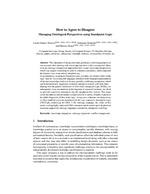How to Agree to Disagree: Managing Ontological Perspectives using Standpoint Logic
From International Center for Computational Logic
How to Agree to Disagree: Managing Ontological Perspectives using Standpoint Logic
Lucía Gómez ÁlvarezLucía Gómez Álvarez, Sebastian RudolphSebastian Rudolph, Hannes StraßHannes Straß
Lucía Gómez Álvarez, Sebastian Rudolph, Hannes Straß
How to Agree to Disagree: Managing Ontological Perspectives using Standpoint Logic
In Ulrike Sattler, Aidan Hogan, Maria Keet, Valentina Presutti, João Paulo A. Almeida, Hideaki Takeda, Pierre Monnin, Giuseppe Pirrò, Claudia d'Amato, eds., Proceedings of the 21st International Semantic Web Conference (ISWC 22), volume 13489 of Lecture Notes in Computer Science, October 2022. Springer
How to Agree to Disagree: Managing Ontological Perspectives using Standpoint Logic
In Ulrike Sattler, Aidan Hogan, Maria Keet, Valentina Presutti, João Paulo A. Almeida, Hideaki Takeda, Pierre Monnin, Giuseppe Pirrò, Claudia d'Amato, eds., Proceedings of the 21st International Semantic Web Conference (ISWC 22), volume 13489 of Lecture Notes in Computer Science, October 2022. Springer
- KurzfassungAbstract
The importance of taking individual, potentially conflicting perspectives into account when dealing with knowledge has been widely recognised. Many existing ontology management approaches fully merge knowledge perspectives, which may require weakening in order to maintain consistency; others represent the distinct views in an entirely detached way. As an alternative, we propose Standpoint Logic, a simple, yet versatile multi-modal logic “add-on” for existing KR languages intended for the integrated representation of domain knowledge relative to diverse, possibly conflicting standpoints, which can be hierarchically organised, combined, and put in relation with each other. Starting from the generic framework of First-Order Standpoint Logic (FOSL), we subsequently focus our attention on the fragment of sentential formulas, for which we provide a polytime translation into the standpoint-free version. This result yields decidability and favourable complexities for a variety of highly expressive decidable fragments of first-order logic. Using some elaborate encoding tricks, we then establish a similar translation for the very expressive description logic SROIQbs underlying the OWL 2 DL ontology language. By virtue of this result, existing highly optimised OWL reasoners can be used to provide practical reasoning support for ontology languages extended by standpoint modelling. - Projekt:Project: DeciGUT, ScaDS.AI
- Forschungsgruppe:Research Group: Computational LogicComputational Logic
@inproceedings{{RS2022,
author = {Luc{\'{\i}}a G{\'{o}}mez {\'{A}}lvarez and Sebastian Rudolph and
Hannes Stra{\ss}},
title = {How to Agree to Disagree: Managing Ontological Perspectives using
Standpoint Logic},
editor = {Ulrike Sattler and Aidan Hogan and Maria Keet and Valentina
Presutti and Jo{\~{a}}o Paulo A. Almeida and Hideaki Takeda and
Pierre Monnin and Giuseppe Pirr{\`{o}} and Claudia {d'Amato}},
booktitle = {Proceedings of the 21st International Semantic Web Conference
(ISWC 22)},
series = {Lecture Notes in Computer Science},
volume = {13489},
publisher = {Springer},
year = {2022},
month = {October}
}
